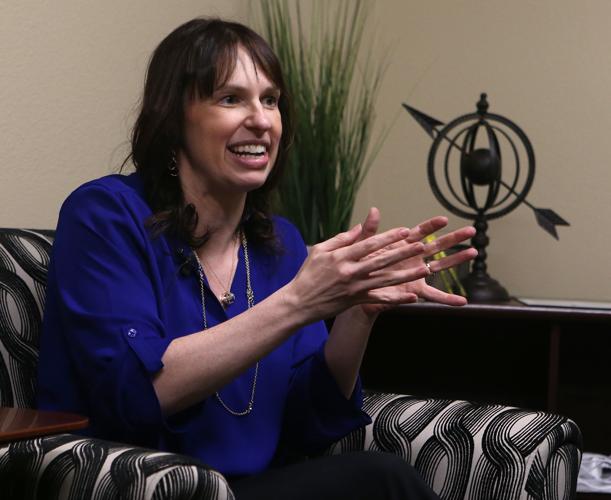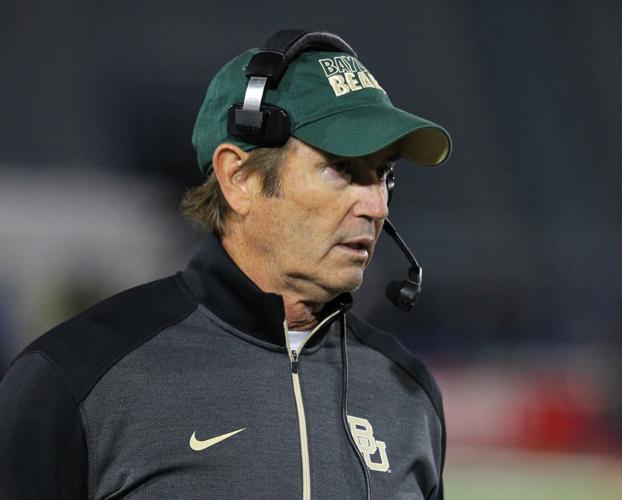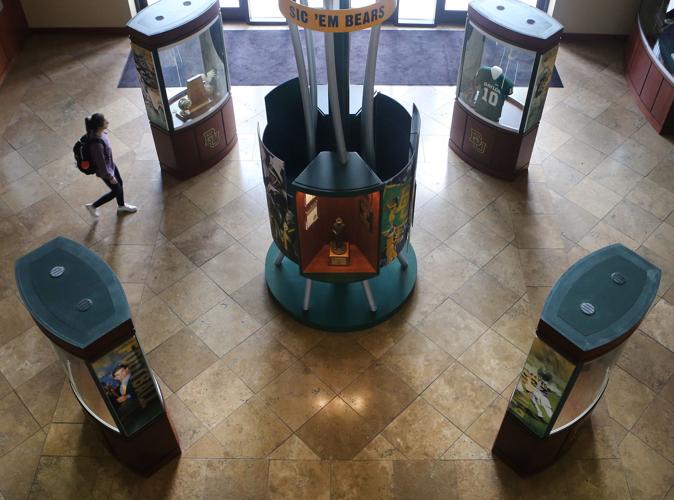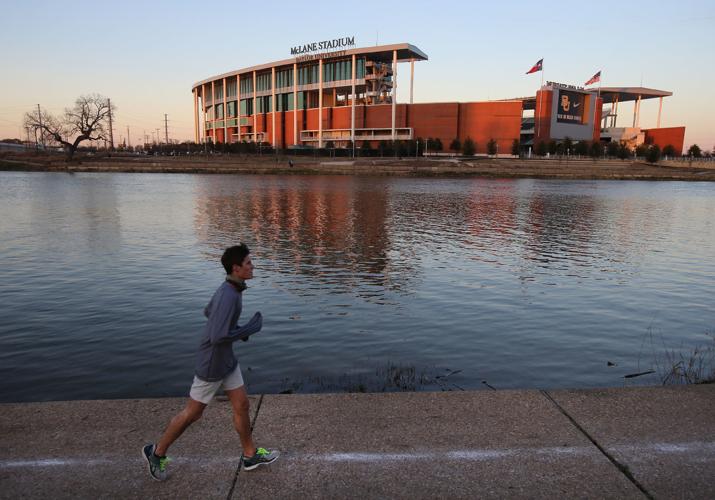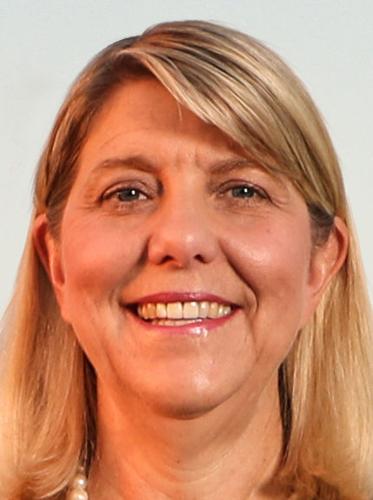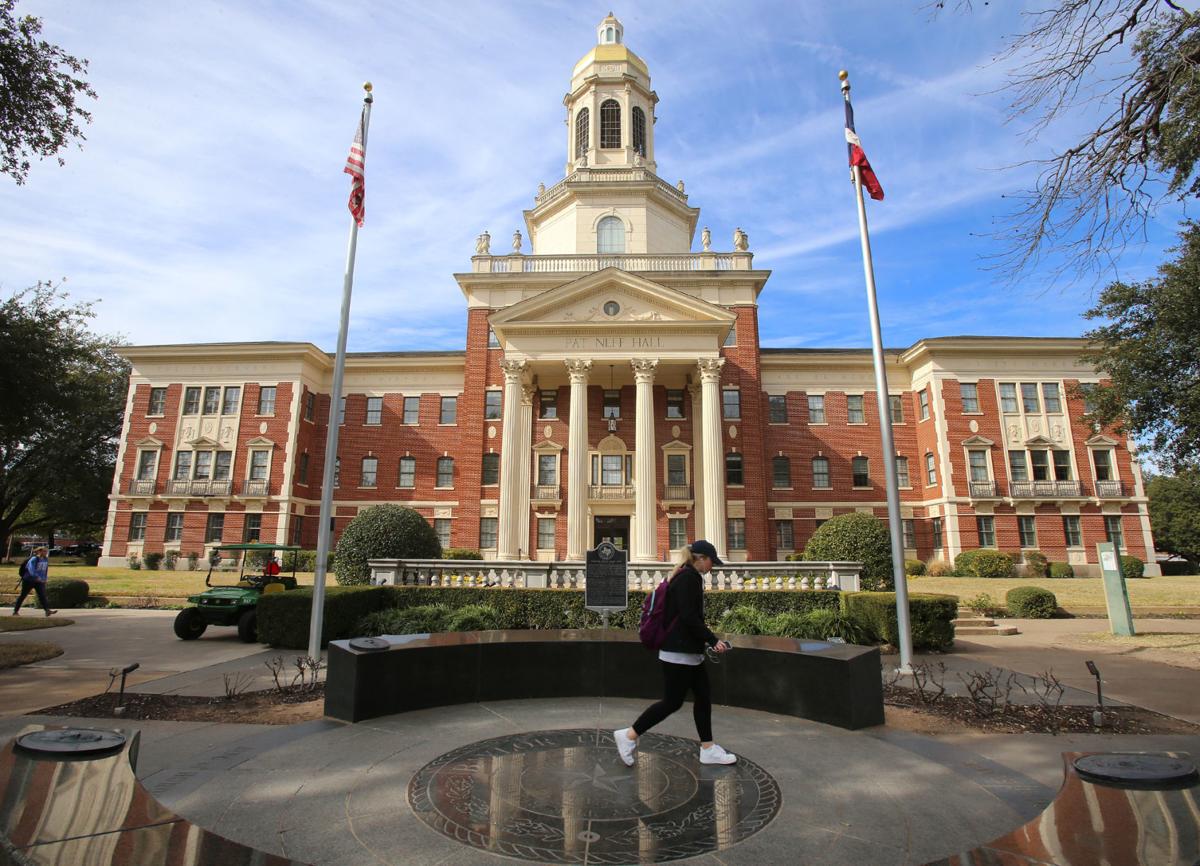This is Part 2 of the Arizona Daily Star’s six-part look into universities’ efforts to enforce and improve Title IX, a federal law that prevents gender discrimination. The Star partnered with Solutions Journalism Network to travel to schools that have made recent changes to their Title IX programs in response to crisis or on their own volition.
WACO, Texas — Drive through any parking lot in this central Texas town and you're bound to spot a Baylor bumper sticker or license plate. Walk into a store or restaurant and you'll see people sporting shirts emblazoned with Baylor green and gold.
School spirit is a way of life here.
It swelled in 2011, when quarterback Robert Griffin III became the school's first Heisman Trophy winner — and in 2013, when the school won its first conference football title in decades.
But the pride exuded by Baylor officials when a Star reporter visited in early February had nothing to do with athletic success. Baylor has become a leader when it comes to enforcing Title IX, a federal law that aims to protect students from discrimination, including gender violence. The university has spent $4.3 million to beef up its Title IX office and staff, hiring dedicated training and prevention coordinators. The university has grown its Title IX office, which is less than a mile from the main campus and athletic facilities.
That all happened after Baylor made national headlines for a series of sexual assaults perpetrated by more than a dozen members of the school’s football program. The resulting scandal cost the football coach, athletic director and university president their jobs.
Episode 2: Baylor's strive to improve Title IX program
Baylor’s new leaders are making Title IX enforcement a priority. The new president, athletic director and Title IX director are all “bought in,” they say, to making the university as safe as possible.
"It can't be, ‘because this happened at Baylor, now we have to do this,’" athletic director Mack Rhoades said. "If that's our attitude, I'm not sure how much we've grown and we've learned."
The Star partnered with the Solutions Journalism Network, which supports reporting that helps solve community problems, to examine universities' efforts to improve their Title IX programs. Baylor was selected because it has already navigated the road the University of Arizona is just heading down, and because it's leading the way in Title IX reform, especially in college athletics.

Title IX complaints against Baylor student-athletes dropped from 10 to 3 over a three-year period, according to the data from ESPN.
Changing perceptions
A breeze and unseasonably warm weather made a perfect setting for students who walked, biked and jogged down Baylor's mall, set against the backdrop of Rosenbalm Fountain.
Over at the Baylor Club, inside McLane Stadium, the line for the lunch buffet wound into the dining room, with diners taking in the view of the Brazos River as they piled their plates with comfort food. Across the dining room, two tables of silver-haired women with cups of coffee settled in for a game of cards on white linen tablecloths.
Baylor's campus, and the area surrounding it, reveals miles of manicured lawns lined with red-brick buildings and steeples. The school's two live mascots, American black bears named for the wives of former university presidents, spend their time in a Department of Agriculture-certified habitat near the bookstore.
Across the street from campus and separated by University Parks Drive is the Simpson Athletics and Academic Center, where most of Baylor's athletic department staff has offices. The campus and athletic department were divided, physically and philosophically.
Not anymore.
Baylor’s new Title IX office, located off-campus in the Clifton Robinson Tower, includes a coffee bar, stocked refrigerator and living room furniture — all there to make students feel comfortable. A nearby counter is filled with resource materials, including pocket-sized cards with a step-by-step guide for student victims of sexual or domestic violence: call the police, seek medical attention and confidential support, and report the incident to the university. It lists emergency phone numbers and Baylor's amnesty policy, which says the school will not pursue disciplinary action against students who report drug or alcohol use in connection with a "good faith" report of a Title IX violation.
Baylor, a Baptist school, forbids alcohol, illegal drugs and premarital sex. An independent investigation found those policies were a barrier that kept some students from reporting sexual assault and domestic violence.
Title IX Coordinator Laura Johnson arrived last year after working at Georgetown College in Kentucky as the school's first Title IX coordinator, among other roles. She wrote Baylor's policies and procedures and talks about Title IX with a passion that is palpable from across the room.
Her job: to change the outside perception of the university by working from inside.

Baylor University’s Title IX Coordinator Laura Johnson.
All incoming freshmen attend an hourlong Title IX session and all new students must complete online Title IX training before they can register for classes. Johnson's office provides "targeted training" to smaller groups upon request.
All Baylor athletes are required to take a class that focuses on how to identify, build and maintain healthy relationships.
Baylor updated its website, making it easier for students to file a complaint or simply seek support.
The university's Title IX program is student-centered, meaning students decide what action they want to take after lodging a complaint.
But there are limitations.
"I always tell students, 'I don't want to dissuade you from reporting, but I also don't want the rug pulled out from you later,'" Johnson said.
If a student appears to be an ongoing threat to the complainant or campus, Johnson's office will take action. The school has an Interim Measures Assessment Team, made up of members of student life, Baylor Police Department and the counseling center, to evaluate situations in which officials suspect a student could be dangerous.
Johnson's Title IX staff is one of the largest in the Big 12 Conference: three investigators, education and prevention specialist Elizabeth Wellinghoff, a coordinator for student support services, an administrative assistant and an office manager.
Baylor's robust Title IX policies and training are fueling an increase in reports.
"A lot of the reports aren't even Title IX-related, but it's a positive sign that students know where to go to report behavior that they aren't comfortable with," Johnson said. The largest number of complaints typically come from freshmen, in part because the intensive training and resources are fresh on their mind.
Johnson likens her office to a funnel. The majority of complainants don't want a full investigation. However, interim measures are put into place, including an alternative dispute resolution process. The office has a tracking document that separates complaints by location, status and club or sport affiliation of both the complainant and the accused.
Title IX is so deeply ingrained in Baylor's culture that posters in every campus restroom stall tout the school's "It's On Us" campaign, which lists contact information for Baylor's Title IX coordinator, counseling center, health center, university chaplain and phone numbers for the Baylor and Waco police departments. The program is supported by student volunteers who serve on an advisory council.
A 'fundamental failure'
Title IX was not an obvious priority at the Baptist school as recently as four years ago.
In August 2015, Baylor football player Sam Ukwuachu — who never played a single down for the Bears — was convicted of sexually assaulting a fellow student. That same month, Texas Monthly magazine published an article detailing the sexual assault conviction of another football player, Tevin Elliott, who was sentenced in January 2014 to 20 years in prison.
Baylor launched an internal investigation of its handling of the Ukwuachu case in response to the article's allegations that officials at his previous school, Boise State, failed to look into the player's expulsion. The nine-month investigation revealed that the problem extended beyond two football players, and the school hired law firm Pepper Hamilton to look back over Baylor's response to Title IX reports by reviewing specific cases.

FILE — In this Sept. 12, 2014, file photo, Baylor coach Art Briles walks the sideline during his team’s NCAA college football game against Buffalo in Amherst, N.Y.
An audit of three years of reports turned up more than a dozen allegations of sexual misconduct by football players — including multiple gang rapes — and a "fundamental failure by Baylor" to implement Title IX and the Violence Against Women Act, according to documents related to the investigation. The review detailed barriers to successful implementation of Title IX, including an inadequate code of conduct, failure to support complainants and, in some cases, a refusal by the university to identify and eliminate a potentially hostile environment.
The investigation also revealed that football coach Art Briles and his staff had attempted to conceal and avoid reporting allegations of misconduct by players. The football staff created a "cultural perception that football was above the rules and that there was no culture of accountability for misconduct," according to the 13-page findings of fact issued by the Baylor Board of Regents.
Pepper Hamilton investigators delivered a 10-hour presentation of their findings to the Baylor Board of Regents, and the board voted to suspend Briles with the intent of firing him. It also requested athletic director Ian McCaw's resignation, with a threat to fire him if he refused.
McCaw resigned on May 30, 2016. University president Ken Starr was reassigned to law professor and chancellor that May; in August, Starr submitted his resignation.

Baylor’s VP and Athletic Director Mack Rhoades, right, with Deputy Athletic Director Dawn Rogers, says: “Our coaches are a big part of (the Title IX program). Our coaches have to own this.”
Owning it
Johnson was drawn to help rebuild Baylor's reputation partly by the enthusiasm of deputy athletic director Dawn Rogers, whom Johnson met during the interview process.
Rogers spent more than nine years as senior associate athletic director and senior woman administrator at Arizona State University before moving to Baylor in July 2017. Rhodes, the athletic director, created what would become Rogers' job shortly after his arrival.
Rogers began fine-tuning the school's Title IX policies almost immediately. Within a year, all Baylor athletes and athletic department staffers underwent five hours of training developed by the Title IX office. Rogers calls the office “a true partner”; a member of the Title IX office sits in on all the training sessions.
Beyond the training, Rhoades has challenged staff members to figure out how to make the issue "live throughout the year."
"Our coaches are a big part of that. Our coaches have to own this," he said. "We always talk about how it’s not going to be important to our student-athletes unless it’s important to our coaches, because they spend the most time with them. They’ve got to be engaged."
Rhoades and Rogers both have teenagers and understand the need to have difficult conversations with young people.
They’ve surrounded themselves with coaches who do the same. Football coach Matt Rhule, hired away from Temple University to replace Briles, overheard a locker-room conversation about women shortly after his arrival and stopped it.
“That’s not who we are,” he told the players who were part of the conversation, according to Rhoades. “That’s not how we’re going to talk.”
Rhoades and Baylor’s administrators knew they had hired the right man.

Baylor athletic director Mack Rhoades, left, congratulates head coach Matt Rhule after defeating Texas Tech in an NCAA college football game Saturday, Nov. 24, 20178, in Arlington, Texas.
Baylor's Title IX program for athletes is modeled after the U.S. Air Force Academy's "Real Relationship Training." It focuses more on what’s acceptable than what not to do. The interactive program teaches positive, proactive sexual assault prevention by motivating and mobilizing student-athletes to develop healthy relationships and recognize signs of unhealthy ones.
All of Baylor's teams undergo Title IX training at the start of every fall semester. The training staff, four women and three men, are all Baylor employees who can tailor their speeches or discussions to their audience. Coaches aren't allowed in the training sessions, allowing the training space to function as a "sacred room," Rogers said.
After the training sessions, participants get surveys seeking feedback. Rogers said the biggest takeaway is that student-athletes want to talk more about what makes a healthy relationship and how to get out of a bad one.
In December, the athletic department launched "Baylor Built," a four-year program that ensures each student-athlete participate in at least 48 hours of character formation training. "Baylor Built" addresses career and leadership development, personal skills, social responsibility and community engagement.
At the start of each school year, all freshman and transfer students attend the "It's on Us" program. This year, a student who had been assaulted at Baylor delivered a testimonial, saying she wished her roommate had encouraged her to report instead of discouraging her.
Beyond all that, the athletic department has hired a counselor specifically for student-athletes. Dr. Monique Marsh-Bell has met with every team and has an office in the Simpson Athletics and Academic Center, serving as a visible reminder that she's there to help.
Constantly changing
Baylor has faced multiple federal Title IX lawsuits related to how former officials handled reports of violence against students. Four cases have been resolved, but some are still pending.
Between 2012 and 2017, Baylor reported that 128 Title IX complaints were filed against students in connection with incidents that happened on or near campus or at school-sponsored activities, according to data provided to ESPN last fall. Of those complaints, 18 were against athletes. Baylor's athletes make up just 3.4 percent of the student body, but accounted for 14.1 percent of the complaints.
That does not include alleged Title IX violations that took place in off-campus residences. Baylor requires that all freshmen live on campus and is considering a similar requirement for sophomores.
In 2015, Baylor reported 10 complaints against student-athletes, according to the data provided to ESPN. In 2016, that number dropped to five and in 2017, the school reported three complaints against athletes.
In February 2017, Baylor announced the firing of strength coach Brandon Washington — who had been hired two months before — for his alleged involvement in a prostitution sting. Two months after that, Baylor fired another new hire, associate director of football operations DeMarkco Butler, in connection with inappropriate text messages he allegedly sent to a teenager.
Rhoades said the prompt firings demonstrated the school's commitment to upholding its new standards and ensuring student safety. Still, the athletic director — a former basketball player at Rincon High School and a University of Arizona graduate — said Title IX programs are “always a work in progress.”
The university tweaks its training materials year to year, and constantly reviews what Rhoades says “is impactful — and maybe not so impactful.”
“At the end of the day, if we’re going to do this, let’s not waste anybody’s time,” he said. “Let’s do it, and make sure it’s impactful and that it’s changing lives and that we’re really teaching young people about how to respect one another, how to have healthy relationships and how to handle difficult circumstances.”

A Baylor University student walks past displays in the Hall of Excellence inside the Simpson Athletics and Academic Center lobby.
Looking back, moving forward
Baylor president Linda Livingstone says the school is in a good place right now, but will always have to work to prevent sexual assault.
"I think we've made just tremendous progress on some of the climate and culture issues that, frankly, led to some of what happened happening the way it did and people not feeling comfortable reporting," Livingstone told the Star during a phone interview in late February.

Baylor University President Linda Livingstone
But no matter how much education and awareness schools provide, sexual assault — which officials know is underreported — will always be an issue on college campuses, Livingstone said.
"We sort of recognize that you're never done with this," Livingstone said. "As we learn more from each situation we experience and collaborate with other universities and learn from their experiences, we're always seeking to get better at what we're doing and to do more to support our students and more to prevent what's happening."
Before coming to Baylor in June 2017, Livingstone — a former Oklahoma State basketball player — served as dean and professor of management at The George Washington University School of Business. Before that, she was dean of Pepperdine University's Graziadio School of Business and Management. She was a faculty member at Baylor from 1991 to 2002.
Livingstone has spoken with other schools about Baylor's efforts to improve Title IX and has been met with a positive response.
"These are not unique circumstances on each of our campuses and anything we can learn from each other on this, the better off we are," she said.
Baylor officials are working hard to reconcile events in the past with their ongoing efforts to improve Title IX efforts across campus. But they realize that acknowledging the past is an important part of moving forward, Livingstone said.
"What happened in the past is part of our history and part of who we are at Baylor," Livingstone said. "While that represents our past, it doesn't represent our present or our future, yet we'll always remember and learn from that."


